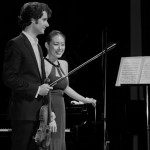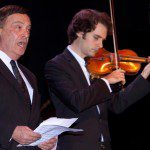Music for the Paris Dead Amid Today’s News
By • December 4, 2015 0 1406

The Embassy Series—the long-standing Washington concert series which brings audiences to the city’s embassies and ambassadorial residences for performances by both established and rising and often classical music stars—held a Dec. 2 concert at the Embassy of France where a memorial to the victims of the recent terrorist attacks in Paris still held sway at the gate.
Although the concert—with the passionate French star Virgil Boutellis-Taft on violin and South Korean Yoonie Han on piano—was on the schedule, it soon became something more in the aftermath of the November 13 attacks in Paris. The concert was dedicated to the victims of that attack, just as another concert back in February was dedicated to the victims of the attacks of the satirical magazine Charlie Hebdo and on a Jewish market on Jan. 7.
In some ways, this was supposed to be an occasion of triumphant sadness and respect, as well as an illustration of the balm and soothing effect of music, how it lets people understand one another and stand together, an aim which succeeded but against the intrusions from the news of yet another unfathomable act of mass violence which trailed arriving audience members like soot.
History, it seems, is no respecter of occasions. Only hours before, news spread that another “active shooter” situation at the Inland Regional Center in sunny San Bernardino, California. By the time we arrived at the embassy, we already knew that at least two to three shooters were involved and that 14 persons had been murdered.
In this atmosphere, after new French Consul General Michel Charbonnier moved the gathering with his introductory remarks and after Embassy Series Director Jerome Barry had led the audience in a rousing singing of “La Marseillaise,” the music and the musicians did their work on memories, both of the day and the time before.
Something about the way these youthful artists carried themselves, made us look and listen, almost insidiously, like ingesting medicine you didn’t know you were taking. They did it by the choice of music, how they played it and how receptive the audience was to it. This is not something you can critique on technique, because emotion, now simmering, now softening, prevailed. The pair made a study in small contrasts.
Boutellis-Taft casts an image of something like a 19th-century poet out of “La Boheme,” a studied casualness in handsome look belied his intense playing—with an immersion in the shorter piece “Caravan” by the 20th-century composer Andre Hossein, whose biography reads like a multinational novel and which began the concert. He and Han played in close physical proximity, with Han, as is sometimes the case with pianists, seeming to be studying the keys intently, with furrowed brows.
Yet, they provide a partnership—Boutellis-Tafts casts about for impossible notes and finds them, adept. He is at ease in familiar work and totally immersed in music that is less so as in Phillippe Hersant’s “Chants du Sud.”
The effect is gradual up to a point. Consider Han beginning her playing of “Claire de Lune,” a work by Debussy, a work so familiar that it elicits almost instant sighs. She treated the music and its playing as if she were handling a sleeping baby, with a tenderness and precise emotion that seemed made for the occasion. She followed that with a pounding abstract piece of music that took you completely out of yourself, also fit for the occasion.
Moments piled upon each other like that so that the occasion for the concert receded, and the alarms and noises of the events in California receded also. They ended with Camille Saint Saens’s “Danse Macabre” with its changing moods and motions—dancing death after all, followed by the rooster announcing the sun—played superbly.
It’s only later that you think, coming home, as the nightly news approached, that we are, after all, living in a “Danse Macabre,” both eager for and dreading the details of the latest atrocity.
- At the Embassy of France Dec. 2: Virgil Boutellis-Taft on violin and South Korean Yoonie Han on piano. | Photo by Hans Spiegel



